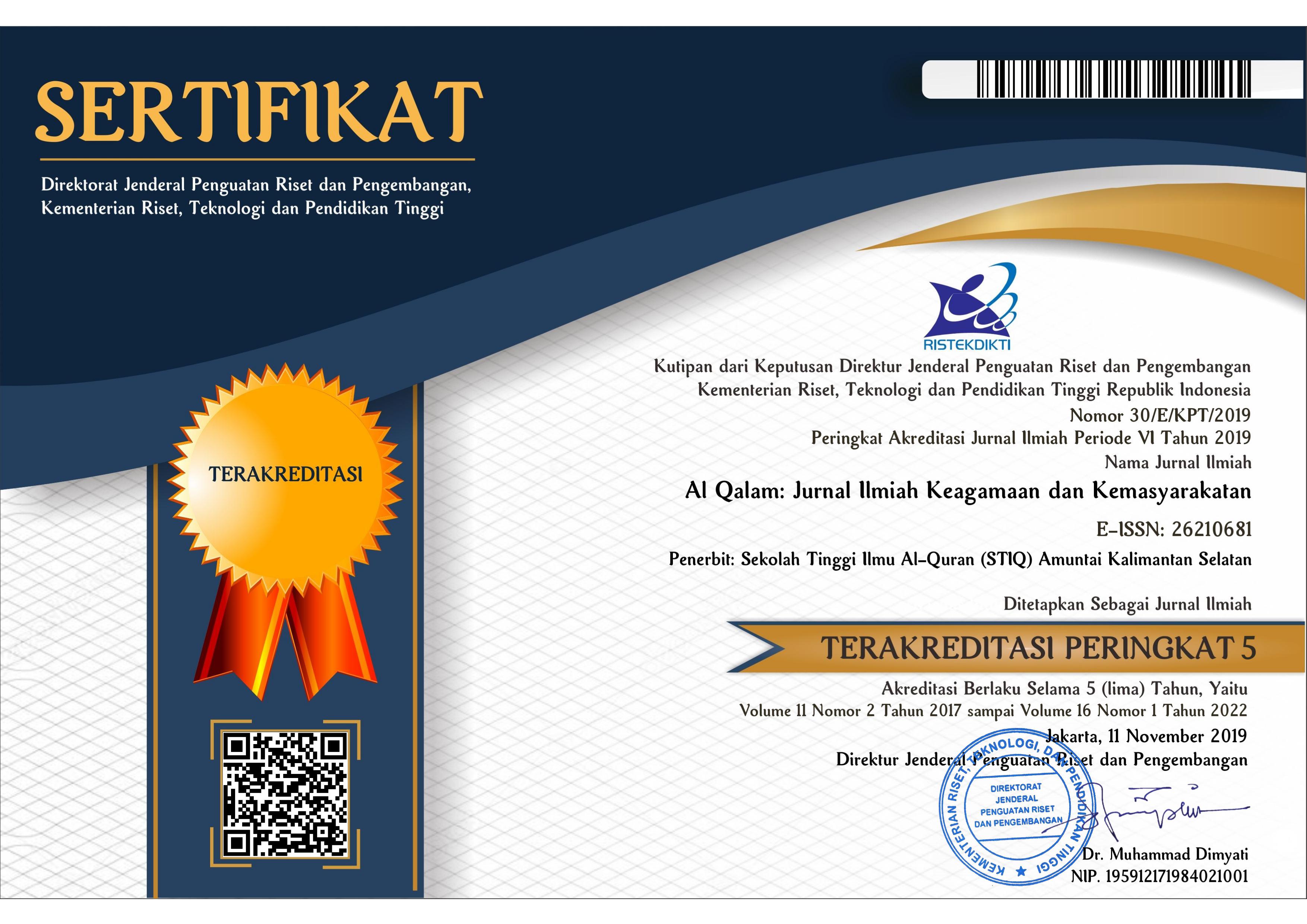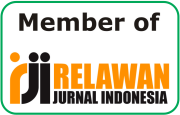Double Movement Theory in Fazlur Rahman's Thought: Social and Religious Applications and Their Impact on Modern Understanding
Abstract
Fazlur Rahman, a leading Islamic thinker of the 20th century, proposed the concept of double movement as an important structure for analyzing the relationship between tradition and modernity in Islamic thought. The term “double movement” reflects Rahman's theory that the evolution of Islamic society included two fundamental movements. This type of research is qualitative research, using library research methods or also called literature review research with a character study approach. Fazlur Rahman's concept of double movement encapsulates the belief that the understanding and interpretation of Islamic teachings must occur in two areas: The First implies a commitment to the written sources and essential doctrines of Islam, while the Second movement represents the rapid adaptation of these teachings into everyday life. day. This theoretical picture stems from a critique of static interpretations of religious texts, which are believed to fall into dogmatism and ignore the experiences of individuals and society. The dual movement theory tries to align Islamic teachings with the needs of contemporary life. The double movement, as articulated by Fazlur Rahman, serves as an important structure for understanding the relationship between traditional texts and contemporary social challenges.
Keywords
Full Text:
PDFReferences
Abbas, M.B. “Between Western Academia and Pakistan: Fazlur Rahman and the Fight for Fusionism.” Modern Asian Studies 51, no. 3 (2017): 736–68. https://doi.org/10.1017/S0026749X15000517.
Abdul Majid, L., and S. Nayan. “Ratio-Legal Fazlur Rahman’s Hermeneutics and Its Influence on Sisters-in-Islam.” Jurnal Living Hadis 6, no. 1 (2021): 105. https://doi.org/10.14421/livinghadis.2021.2648.
Ahmad, H. “Mapping Neo-Modern and Postmodern Qur’ānic Reformist Discourse in the Intellectual Legacy of Fazlur Rahman and Mohammed Arkoun.” Religions 14, no. 5 (2023): 595. https://doi.org/10.3390/rel14050595.
Ainurrofiq, F. “The Use of Hermeneutics Double Movement Fazlur Rahman in Comprehending Hadith of the Unsuccessful Leadership of Women.” Jurnal Ushuluddin 27, no. 2 (2019): 132. https://doi.org/10.24014/jush.v27i2.6719.
Akbar, A. “Fazlur Rahman’s Influence on Contemporary Islamic Thought.” The Muslim World 110, no. 2 (2020): 129–53. https://doi.org/10.1111/muwo.12334.
Bektovic, S. “Towards a Neo-Modernist Islam.” Studia Theologica: Nordic Journal of Theology 70, no. 2 (2016): 160–78. https://doi.org/10.1080/0039338X.2016.1253260.
Bilal, J. “Academic Researches on Fazlur Rahman: An Assessment.” Analisa: Journal of Social Science and Religion 6, no. 1 (2021): 47–62. https://doi.org/10.18784/analisa.v6i01.1288.
Haider Ali, N.G., A. Khan, C. Ali, et al. “Concept of Shūra in Fazlur Rahman’s Political Ideas at Practical Level.” Journal of Islamic Thought and Civilization (JITC 8, no. 2 (2018). https://doi.org/10.32350/jitc.
Hannani, H., and I. Haq. “Transformative Islamic Law: Fazlurrahman’s Study of Islamic Law Interpretation Towards Islamic Theoanthropocentrism.” KURIOSITAS: Media Komunikasi Sosial dan Keagamaan 15, no. 2 (2022): 270–83. https://doi.org/10.35905/kur.v15i2.4936.
Irfan, M.M., and F. Shalehah. “Application of Fazlur Rahman’s Double Movement Theory about Milk al-Yāmin.” At-Tajdid: Jurnal Pendidikan dan Pemikiran Islam 6, no. 1 (2022): 71. https://doi.org/10.24127/att.v6i1.2143.
Jesse, M.Catherine. A Modern Muslim Intellectual: The Thought of Fazlur Rahman with Special Reference to Reason. UMI Dissertation Information Service, 1995.
Lubis, A.A.-B. “Government System in Islamic Law in the Perspective of Fazlur Rahman.” Mizan: Journal of Islamic Law 7, no. 1 (2023): 19. https://doi.org/10.32507/mizan.v7i1.1850.
Maghfiroh, Mauliana, and Ahmad Musyafiq. “Islamic Moral Ideas In Fazlur Rahman’s Perspective.” Islamadina : Jurnal Pemikiran Islam 25, no. 1 (2024): 100–113. https://doi.org/10.30595/islamadina.v0i0.19480.
Maghribi, H., and A. Hidayah. “Contesting the Exegetical Approaches of Muhammad Abduh and Fazlur Rahman to the Qur’ān.” Religia 26, no. 1 (2023): 40–57. https://doi.org/10.28918/religia.v26i1.865.
Moleong, Lexy J. Metode Penelitian Kualitatif. Remaja Rosdakarya, 2009.
Nugroho, K., M.Z. Kiram, and D. Andriawan. “The Influence of Hermeneutics in Double Movement Theory (Critical Analysis of Fazlurrahman’s Interpretation Methodology.” QiST: Journal of Quran and Tafseer Studies 2, no. 3 (2023): 275–89. https://doi.org/10.23917/qist.v2i3.2531.
Ozdemir, I. “The Concept of Islamic Tradition in Fazlur Rahman’s Thought.” American Journal of Islam and Society 9, no. 2 (1992): 243–61. https://doi.org/10.35632/ajis.v9i2.2558.
Rahman, Fazlur. Gelombang Perubahan dalam Islam: Studi tentang Fundamentalisme Islam. 2nd ed. Edited by Ebrahim Moosa. Rajawali Press, 2001.
Rozaq, Abd. “Qur’anic Hermeneutics and Its Applications by Fazlur Rahman.” International Journal of Islamicate Social Studies 1, no. 2 (2023): 115–24. https://doi.org/10.62039/ijiss.v1i2.27.
Usman, A.H., Mohd F.R. Abdullah, Muhd N.Abdul Kadir, and A. Iskandar. “The Concept of an Ideal Society: A Review of Fazlur Rahman’s Perspective.” International Journal of Islamic Thought 6 (2022): 1–12. https://doi.org/10.24035/ijit.21.2022.220.
Yusuf, M., N. Nahdhiyah, and A. Sadat. “Fazlur Rahman’s Double Movement and Its Contribution to the Development of Religious Moderation.” IJISH (International Journal of Islamic Studies and Humanities) 4, no. 1 (2021): 51. https://doi.org/10.26555/ijish.v4i1.2667.
DOI: http://dx.doi.org/10.35931/aq.v19i5.4747
Refbacks
- There are currently no refbacks.
Copyright (c) 2025 Dedisyah Putra, Martua Nasution, Nuriza Acela

This work is licensed under a Creative Commons Attribution 4.0 International License.
Al Qalam: Jurnal Ilmiah Keagamaan dan Kemasyarakatan
index by:
Publish by:
Sekolah Tinggi Ilmu Al-Qur'an Amuntai
Contact us:
Address: Jl. Rakha Pakapuran, Amuntai Utara
Kabupaten : Hulu Sungai Utara
Kode Pos : 71471
Provinsi : Kalimantan Selatan
Telephone : 085251613000
Email: hafizhihusinsungkar@gmail.com

This work is licensed under a Creative Commons Attribution 4.0 International License


